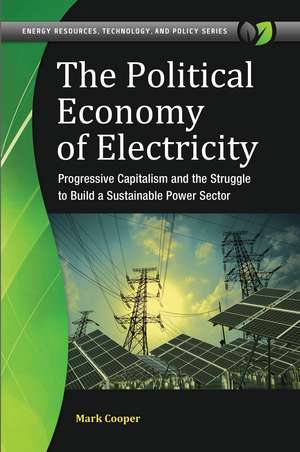The Political Economy of Electricity: Progressive Capitalism and the Struggle to Build a Sustainable Power Sector: Energy Resources, Technology, and Policy
Autor Mark Cooperen Limba Engleză Hardback – 23 apr 2017 – vârsta până la 17 ani
Preț: 469.80 lei
Preț vechi: 712.19 lei
-34% Nou
Puncte Express: 705
Preț estimativ în valută:
89.92€ • 97.71$ • 75.59£
89.92€ • 97.71$ • 75.59£
Carte tipărită la comandă
Livrare economică 21 aprilie-05 mai
Preluare comenzi: 021 569.72.76
Specificații
ISBN-13: 9781440853425
ISBN-10: 1440853428
Pagini: 472
Dimensiuni: 156 x 235 x 30 mm
Greutate: 0.94 kg
Editura: Bloomsbury Publishing
Colecția Praeger
Seria Energy Resources, Technology, and Policy
Locul publicării:New York, United States
ISBN-10: 1440853428
Pagini: 472
Dimensiuni: 156 x 235 x 30 mm
Greutate: 0.94 kg
Editura: Bloomsbury Publishing
Colecția Praeger
Seria Energy Resources, Technology, and Policy
Locul publicării:New York, United States
Caracteristici
Presents comprehensive and understandable reviews of more than 200 recent empirical studies of market imperfections in the energy efficiency and climate change literature, providing a basis for targeting policies at the most important causes of poor market performance
Notă biografică
Mark Cooper is Senior Fellow for Economic Analysis at the Institute for Energy and the Environment at Vermont Law School.
Cuprins
Series ForewordPART I: HISTORICAL CONTEXTChapter 1 IntroductionChapter 2 The Political Economy of the Paris Agreement, Technological Progress, and the Decarbonization-Development DilemmaPART II: ANALYTIC FRAMEWORKChapter 3 The Technological Revolutions of Industrial CapitalismChapter 4 The Innovation System of Progressive CapitalismPART III: THE COMPLEXITY OF RESOURCE SELECTION IN A LOW-CARBON ELECTRICITY SECTORChapter 5 The Cost of Electricity in a Low-Carbon FutureChapter 6 Energy Potential and Institutional Resource NeedsPART IV: CHALLENGESChapter 7 Conceptualizing Market ImperfectionsChapter 8 The Nuclear War Against the FuturePART V: POLICY RESPONSES AND DECISIONMAKING TOOLSChapter 9 The Urgent Need for Policy Action: "Command but Not Control"Chapter 10 Decision Making and the Terrain of KnowledgeChapter 11 Application of Multicriteria Portfolio AnalysisEpilogue: The Importance of Local Support for Global Climate Policy If the United States Flip-Flops on the Paris AgreementAppendix I: Democratic Equality and the Encyclical on Climate Change as Progressive CapitalismAppendix II: Conceptual Specification of Market ImperfectionsAppendix III: Empirical Evidence on Policy Directly Evaluating Price in the Climate Change AnalysisNotesBibliographyIndex









